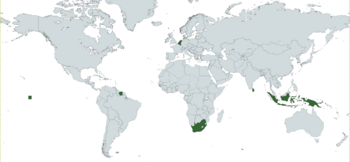Amsterdam Commonwealth: Difference between revisions
(Created page with "{{Infobox geopolitical organization |name = '''Amsterdam Commonwealth''' |native_name = <!-- Long-form name in native or any/all non-English languages --> |...") |
No edit summary |
||
| Line 75: | Line 75: | ||
|footnotes = <!-- For generic non-numbered footnotes --> | |footnotes = <!-- For generic non-numbered footnotes --> | ||
}} | }} | ||
The '''Amsterdam Commonwealth''', better known as the '''Dutch Commonwealth''', is a political association of five member states, namely the {{wp|Netherlands}}, {{wp|Suriname}}, {{wp|South Africa}}, {{wp|Indonesia}}, and {{wp|Papua New Guinea}}, all four of which, except for the {{wp|Netherlands}} itself, were formerly colonised by the {{wp|Dutch}} throughout the 15th to 20th centuries. Formed on 20 March 2000 by the {{wp|Amsterdam Proclamation}}, the Amsterdam Commonwealth is overseen by a ceremonial head, currently [[Alexandra of the United Kingdom and of the Netherlands|Queen Alexandra]], while the [[Secretary-General of the Amsterdam Union|Secretary-General]] and the [[Chairman of the Amsterdam Union|Chairman]] manage the organisation's day-to-day operations. | |||
Considered and seen by many to be the {{wp|Dutch}} version of the {{wp|United Kingdom}}'s {{wp|Commonwealth of Nations}}, uniquely enough, unlike the latter, none of the Amsterdam Commonwealth's five member states, with the exception of the {{wp|Netherlands}} itself, have the [[Alexandra of the United Kingdom and of the Netherlands|Queen]] as its head of state, although they nonetheless recognise the monarch as the ceremonial head of the organisation. In addition, the organisation's working language is officially {{wp|English}} instead of {{wp|Dutch}}, given the scarcity of fluent {{wp|Dutch}} speakers in the non-{{wp|Dutch}} speaking member states. | |||
Much like the {{wp|Commonwealth of Nations}}, member states possess no legal obligations to one another but are nonetheless connected through their historical ties. Centrally, the organisation strongly upholds the values of liberty, equality, and fraternity, with member states often encouraged to promote and practice such values to the fullest extent. | |||
Revision as of 08:25, 1 November 2022
Amsterdam Commonwealth | |
|---|---|
 Member states of the Amsterdam Commonwealth | |
| Headquarters | Amsterdam, Netherlands |
| Working language | English |
| Type | Voluntary association |
| Leaders | |
| Alexandra | |
| Trienke Brussen | |
• Chairman | Maurits Wildeboer |
| Establishment | |
| 20 March 2000 | |
| Area | |
• | 3,825,326 km2 (1,476,967 sq mi) |
| Population | |
• 2021 estimate | 374,805,862 |
• Density | 97/km2 (251.2/sq mi) |
| GDP (PPP) | 2021 estimate |
• Total | $6.90 trillion |
• Per capita | $18,426 |
| GDP (nominal) | 2021 estimate |
• Total | $3.35 trillion |
• Per capita | $8,950 |
| HDI (2021) | high |
The Amsterdam Commonwealth, better known as the Dutch Commonwealth, is a political association of five member states, namely the Netherlands, Suriname, South Africa, Indonesia, and Papua New Guinea, all four of which, except for the Netherlands itself, were formerly colonised by the Dutch throughout the 15th to 20th centuries. Formed on 20 March 2000 by the Amsterdam Proclamation, the Amsterdam Commonwealth is overseen by a ceremonial head, currently Queen Alexandra, while the Secretary-General and the Chairman manage the organisation's day-to-day operations.
Considered and seen by many to be the Dutch version of the United Kingdom's Commonwealth of Nations, uniquely enough, unlike the latter, none of the Amsterdam Commonwealth's five member states, with the exception of the Netherlands itself, have the Queen as its head of state, although they nonetheless recognise the monarch as the ceremonial head of the organisation. In addition, the organisation's working language is officially English instead of Dutch, given the scarcity of fluent Dutch speakers in the non-Dutch speaking member states.
Much like the Commonwealth of Nations, member states possess no legal obligations to one another but are nonetheless connected through their historical ties. Centrally, the organisation strongly upholds the values of liberty, equality, and fraternity, with member states often encouraged to promote and practice such values to the fullest extent.
